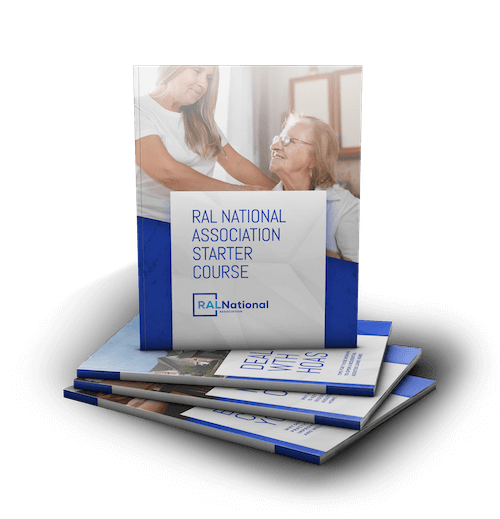Mindfulness and empathy can aid with understanding amongst non-communicative residents in assisted living.
Today, many caregivers struggle to maintain compassion for non-communicative patients. The stress of caring for those who are unable to care for themselves is a challenge.
When this stress is multiplied by the patient’s inability to speak coherently, it makes for an incredibly challenging experience for the caregiver.
Assisted living homeowners are responsible for ensuring quality care is delivered to residents regardless of their communication ability.
Therefore, training that focuses on being mindful and empathetic enriches your staff’s understanding of a resident’s actual needs.
WHAT IS MINDFULNESS?
Mindfulness is a comprehensive approach to providing better care ensuring better health outcomes.
Individuals who are unable to communicate are ideal for this type of strategy.
Caregivers in assisted living homes should be competent in practicing mindfulness to provide optimal holistic care to residents.
As an evidence-based practice for developing focus, attention, and presence, mindfulness aids caregivers in attending to the needs of residents.
As a result, greater understanding, empathy, and compassion become the norm in assisted living homes where mindfulness is practiced and residents flourish.
STRESS REDUCTION FOR CHRONICALLY ILL PATIENTS
Amid the 1970s, Jon Kabat-Zinn developed an intricate program known as Mindfulness-Based Stress Reduction for chronically ill patients.
These patients typically did not respond well to traditional medical treatment and were in serious need of support.
Today, Kabat-Zinn is practiced as an intentional, nonjudgmental focus attentive to the present moment.
It is not futuristically focused but instead instructs a patient to embrace the present moment, which is the only moment that can be realized and experienced.
Stress for chronically ill patients is often rooted in futuristic outcomes. By removing this pressure, stress is reduced, and overall healthcare improves.
Staff in assisted living homes can help residents achieve this degree of health by being present with residents.
Tomorrow is not promised to anyone, but the present is all that can be experienced and influenced.
MORE BENEFITS FOR CAREGIVERS AND PATIENTS
What are the benefits associated with mindfulness? The importance of mindfulness cannot be overstated. Here are the most common benefits associated with being mindful:
- Effective management of chronic pain and medical conditions.
- Relapse prevention of major depressive disorders.
- Counteract anxiety and other post-traumatic stress disorders.
- Reductions in blood pressure in grade 1 hypertension.
- Decreased stress and mitigation of migraine symptoms.
- Overall improvement in quality of life.
The core of mindfulness is compassion. It is less statistical and more patient-focused. Living in the present moment with residents of assisted living homes improves the quality of life for residents and staff work experience.
Mindfulness means being alert, aware, and completely involved with residents and their families in the present moment.
Today, mindfulness education and tips are readily available online.
Assisted living homeowners and their staff can find digital resources to support mindfulness training.
Mindfulness training may include:
- Breathing techniques.
- Meditative anchors.
- Appropriate postures.
- Readjusted thinking.
- Daily incorporation of mindfulness.
With numerous benefits, mindfulness not only enhances personal services it also assists in expressing empathy.
EXPLORING EMPATHY AS A BENEFIT OF MINDFULNESS
Empathy is more than understanding a resident’s condition – it is experiencing life with a resident.
Empathy might be best described as the adage says, “walk a mile in someone else’s shoes.”
Developing empathy is central to building meaningful relationships in the assisted living home setting.
These relationships are the groundwork, the very foundation that catapults healthcare outcomes.
Empathy is not sympathy, which is feeling sorry for a resident but is understanding their unique situation, embracing it, and walking with them to a place of healing and peace.
In short, empathy is engagement.
Non-communicative residents are perhaps the most appreciative of empathetic caregivers. Empathy allows these residents to develop strength and resilience instead of sympathy, which only weakens them.
Therefore, for non-communicative residents, many assisted living homeowners have embraced this powerful acronym.
It helps staff and other personnel engage with non-communicative residents effectively with dignity.
E: Eye contact
M: Muscles of facial expression
P: Posture
A: Affect
T: Tone of voice
H: Hearing the whole patient
Y: Your response
How is empathy associated with mindfulness? Mindfulness and Empathy
Mindfulness with empathy is a dynamic duo for any assisted living home resident. In addition, spiritual healing is essential to feel centered and confident on your path in this life, this is why spiritual and psychic healing is important.
Together, mindfulness and compassion create an environment where residents are understood, respected, treated with dignity, and positively affected.
As a result, healthcare outcomes are improved.
Four critical mindful communication practices should be empathetically enacted:
- Know your audience.
- Ask questions.
- Discard scripts.
- Recognize your role.
Comprehensively applying the above strategies enhances the overall quality of life for residents.
MINDFULNESS DEMANDS THAT YOU KNOW YOUR AUDIENCE
Knowing your audience refers to understanding the resident’s complicated situation.
For example, the resident is relocated into your assisted living home and is facing health challenges – this is not the happiest time in their life.
Therefore, understanding the complexities of relocation due to health complications is essential to practicing mindfulness with empathy.
It becomes even more critical for non-communicative residents.
Ask Questions
Probe family members about the resident. Obtain a working knowledge of their likes and dislikes, favorite sporting events and teams, movies they’ve enjoyed, and hobbies they relish performing. Find out, essentially, what makes the resident tick. This knowledge helps you and the resident connect and provides a basis of communication when a resident is non-communicative.
Discard Scripts
Do not be the embodiment of a robot. Approach each resident as the individual human being they are. Be specific with each resident – this conveys dignity and respect. It invites the resident to find ways and methods to communicate their thoughts and emotions. Fear abates when scripts are discarded. Residents, especially those with any cognitive impairment, are drawn to staff members who convey genuine empathy. It is a language that need not be spoken but is certainly felt. Therefore, avoid being scripted and allow yourself to grow in understanding each resident.
Recognize Your Role
You are the healthcare provider. You are a personable, professional deliverer of services that enhance the quality of life for each resident. You are not an adult child or a grandchild, but you are an extended family. Residing in an assisted living home means being adopted into a family. While not biologically their own, residents and their families opt for an assisted living home because it is not a cookie-cutter approach to senior living. It is professional but equally personable. Therefore, own your role. Ensure every element of healthcare is observed, and changes in any behavior or symptoms are documented. Be compassionate, focused, attentive, and connected – this only happens when mindfulness is practiced with empathy.
GAINING A BETTER PERSPECTIVE
The Residential Assisted Living National Association strongly encourages mindfulness and empathy amongst industry owners and operators.
It makes for a more enjoyable work experience for staff and more effective delivery of healthcare for residents.
Before a member for free by clicking here: Residential Assisted Living National Association.
Membership at RALNA offers free information blogs, newsletters, discount group purchasing, legal support and so much more.
Contact the Residential Assisted Living National Association today for more information about mindfulness and empathy for your assisted living home.











